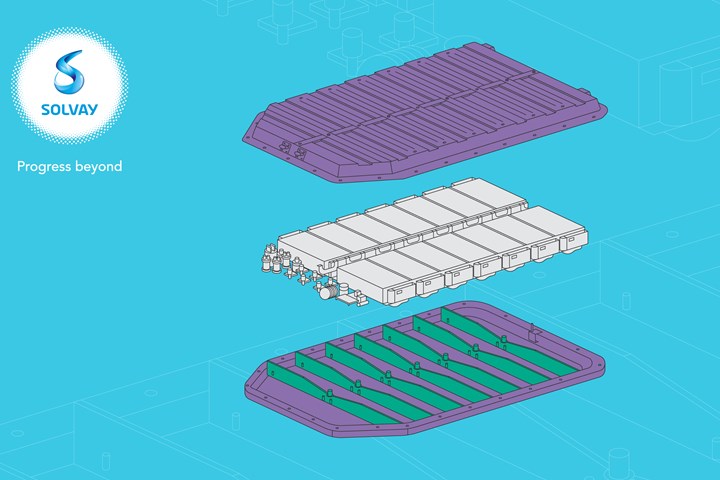Solvay, Airborne receive funding for composite battery enclosures
Collaboration is targeted at maximizing the energy capacity of lightweight and compact next-generation battery packs for e-mobility, while also targeting reuse of composite waste.
Solvay (Alpharetta, Ga., U.S.) has announced that its Battery Enclosure Materials Automation (BEMA) project for developing an all-composite solution for energy-efficient battery packs, in collaboration with automated composites manufacturing company Airborne (The Hague, Netherlands), has won major funding by Innovate UK as part of UK Research and Innovation, the U.K.’s national innovation agency.
According to Solvay, BEMA has already received letters of support from Jaguar Land Rover (Mahwah, N.J., U.S.) and Vertical Aerospace (Bristol, U.K.). Both companies see great potential in the design of more compact and lightweight enclosures for high-energy batteries in future electric cars and aircraft, and are interested in the sustainability aspect of this project which aims to reuse composite waste.
“There is a pressing need to meet net-zero emission regulations and targets with more energy-efficient electric powertrain and propulsion solutions,” Mark Wright, EMEA sales manager, automotive, at Solvay Materials, says. “While already lending structural and weight saving advantages over metals in existing EVs and aircraft, fully composite battery designs for larger production volumes have yet to show their technical and manufacturing feasibility. BEMA seeks to deliver on these challenges by combining the benefits of Solvay’s advanced thermosetting material technology with Airborne’s expertise in flexible automated composite manufacturing systems to create lightweight next-generation battery packs. This will provide a significant step-change towards higher energy efficiency at reduced size.”
According to Joe Summers, commercial director of Airborne, as the demand for industrial quantities of composite battery enclosures grows, the challenge is to shorten the design phase, and provide Design-for-Automation guidance. “Working with Solvay will build material characteristics into Design-for-Manufacture rules for our multi-material automated ply placement technology, and subsequently allow us to connect our adaptable automation platform with intelligent planning and optimization,” Summer adds.
BEMA is currently in a pre-industrial testing and evaluation stage. Mechanical impact, shielding, thermal and fire performance tests are underway at Solvay’s Composite Materials Application Centre in Heanor, U.K., and at external service providers. In a next project phase, prototypes will be produced to validate the new composite battery enclosure solutions in field trials and obtain proof of concept for industrialization. The project will also address rate capability, cost and sustainability challenges. Tangible and dependable results are expected within an overall project time of two years.
For more resources related to composite battery enclosures, read more about thermal runaway testing of Pyromeral’s PyroKarb covers, or AZL’s 2022 project kickoff for new battery enclosure concept developments.
Related Content
-
New Coolant Designed for Automotive Parts Production
Choosing the right coolant is critical for productivity, economic efficiency and machining quality.
-
Arch Cutting Tools Acquires Custom Carbide Cutter Inc.
The acquisition adds Custom Carbide Cutter’s experience with specialty carbide micro tools and high-performance burrs to Arch Cutting Tool’s portfolio.
-
DN Solutions Responds to Labor Shortages, Reshoring, the Automotive Industry and More
At its first in-person DIMF since 2019, DN Solutions showcased a range of new technologies, from automation to machine tools to software. President WJ Kim explains how these products are responses to changes within the company and the manufacturing industry as a whole.














.jpg;maxWidth=300;quality=90)


